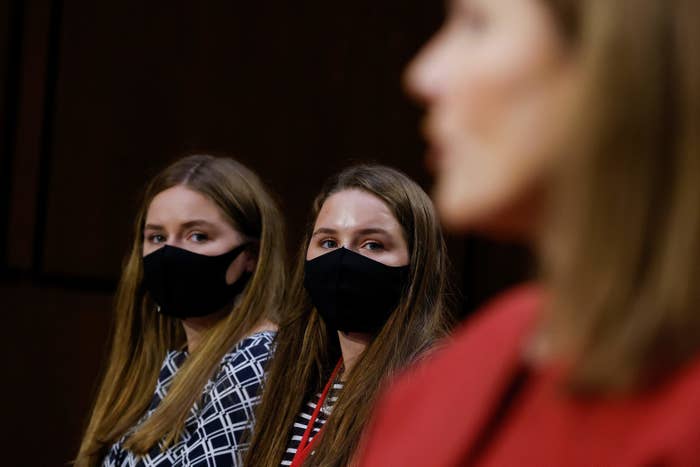
This week’s Senate confirmation hearings for Amy Coney Barrett, Donald Trump’s Supreme Court nominee, feel very different from the Kavanaugh spectacle of 2018.
The biggest distinction, of course, is that Brett Kavanaugh, the first of Trump’s nominees to make his senatorial case for a seat on the bench, was credibly accused of sexual assault. Those hearings were extraordinary. Raw. Kavanaugh, red-faced and raging, remains “indelible in the hippocampus” to so many assault survivors who watched the vile pageantry unfold before us those few days, we who have grown up in a society in which boys’ feelings and ambitions are so often prioritized at girls’ expense.
Judiciary Committee Republicans were eager for a more “civil” process this time around. In his opening statement earlier this week, Sen. John Kennedy described 2018 as a “freak show,” choosing a head-scratching metaphor: “It looked like the cantina bar scene out of Star Wars.” Not only were emotions then running sky-high on both sides of the aisle, but protesters had flooded the hallways surrounding the hearing room, some of them wearing the red robes of handmaidens; others sought out senators in other halls of government and pleaded with them to consider their experiences, going viral as a result.
This year, the coronavirus pandemic has left those halls silent. What’s more, as Intelligencer’s Ed Kilgore points out, “this time the nominee’s character and personal background are assets, not handicaps.” While both nominees were Roman Catholics and Federalist Society members, Kilgore writes, “Barrett’s background has served as both shield and sword for her proponents in a way that Kavanaugh’s did not.” Though Republicans tried defending Kavanaugh as a family man, a “father of daughters” — referencing his time as a girls basketball coach — it wasn’t to nearly the same effect.
Conservatives have long accused Democrats of harboring anti-Catholic bias against Barrett, as they claimed was the case during her 2017 hearings for a spot on the 7th Circuit. It’s a clever move for Republicans, who can cry religious bias should any Democratic senators try to investigate any possible connections between Barrett’s ardent faith and her views on, say, abortion and marriage equality. (The faith group with which she’s associated, People of Praise, opposes abortion and expels members for gay sex; Barrett also gave talks to anti-abortion groups in 2013, which she initially failed to disclose to the Senate ahead of her hearing.) The other, perhaps more significant part of her personal background that works quite nicely as both sword and shield: Barrett is a mother. And not just any mother, but a mother who works, returning at the end of the day to a house of seven children, two of whom were adopted from Haiti.
Nearly every Republican senator during the hearings mentioned Barrett’s large brood in an awe-inspired way. She is “remarkable,” the senators told her — a “superstar.” Barrett, for her part, has embraced the supermom narrative. She brought most of her large family to watch the hearings and made clear on the day of her nomination that while she’s a judge at work, she’s “better known back home as a room parent, carpool driver, and birthday party planner.”
Conservative pundits and columnists have crowed that the hysterical, naggy Democrats weren’t able to "Kavanaugh" a superwoman. The glorified, even fetishized ideal of conservative, religious white womanhood made Barrett an ideal candidate, even before she was memed for not taking any hearing notes, supposedly evidence of her brilliance.
The two Republican women on the committee went so far as to insinuate that Barrett’s Democratic critics were, in fact, being anti-feminist in daring to oppose her nomination. Sen. Joni Ernst of Iowa told Barrett that the Dems were “attacking you as a mom and a woman of faith” with accusations that are “demeaning to women … that you, a working mother of seven with a strong record of professional and academic accomplishment, couldn’t possibly respect the goals and desires of today’s women.”
Slate’s Christina Cauterucci captures the narrative’s “insidious sexism”:
Ernst’s implication, that being a mom with a job makes Barrett a friend to women, regardless of how her jurisprudence affects their lives, is exactly the kind of narrow reading of feminism anti-feminists would like to promote: one that encourages prolific motherhood for some while stigmatizing it for others; one that would force women into unwanted childbirth, then abandon them and their children once they’ve left the womb; one that disregards the unearned privileges and social forces that allow some women to thrive while keeping others in a state of precarious struggle; and one that points to the advancement of certain individual women as evidence that gender discrimination does not exist.
This is the conservative savvy of a pick like Barrett: “She is the perfect combination of brilliant jurist and a woman who brings the argument to the court that is potentially the contrary to the views of the sitting women justices,” Marjorie Dannenfelser, the president of the Susan B. Anthony List, an anti-abortion political group, told the New York Times last month. Even though, by 2020, we should know better than to assume that a single representative of a demographic will always best represent that demographic, Democrats would have to tread carefully were they to so much as insinuate that Barrett, a woman, might not ensure the best futures for most (nonwhite, non-Christian, not straight or cis, not financially comfortable) women, a majority of whom want to keep abortion legal.
So too were Barrett defenders able to wield her motherhood status when it came to where she stands on racial justice. Earlier this week, when Sen. Cory Booker asked her if she condemns white supremacy — noting that the president who appointed her has failed to do so in a straightforward way — he was slammed on the conservative internet for what was apparently a deeply offensive question, given that, as the Blaze and many other conservative outlets pointed out, Barrett is the mother of two Black children. (She answered Booker in the affirmative.)
Though the grown children of transracial adoption will readily tell you that being the adoptive parents of kids of color doesn’t magically make white people not racist (and can even help mask their racism), it’s automatically assumed of white, partnered, religious mothers — in the way it isn’t for Black mothers, or single mothers, or poor mothers, many of whom tend to be vilified rather than lionized — that they can do little wrong.

To be clear, I don’t know anything about what kind of mother Barrett is, and in all likelihood she’s a good and loving parent. But she’s given the benefit of the doubt in the way that I can’t at all imagine a single Black mother of seven children would have. What’s more: It’s assumed that her particular brand of motherhood would actually make her a better justice. To deflect Democratic worries that Barrett’s confirmation could threaten the status of the Affordable Care Act, which has occupied a large chunk of the hearings, Sen. Charles Grassley suggested that “as a mother of a seven, Judge Barrett clearly understands the importance of healthcare.”
Meghan Daum, who’s written extensively about the stereotypes leveled against childless women, wrote in her column for GEN this week that both Barrett and vice presidential nominee Kamala Harris, who’s frequently emphasized her role as a stepmother and aunt, or “Momala,” on the campaign trail, are evidence of an “assumption ... that female leaders can’t really be trusted unless they’re mothers. Or, at the very least, they can’t be trusted by campaign strategists to be relatable to the public at large.”
“It’s that tightrope that women have to walk that men don’t,” Christine Matthews, a Republican pollster who focuses on female voters, told the New York Times in a story this week about the “freighted expectations for women” holding public office. Men typically aren’t subjected, as Barrett and so many other working mothers have been, to questions about how they can possibly do it all. (Barrett has mentioned that her husband does “more than” his fair share of work at home, and that they have “friends and fearless babysitters” helping out. While we don’t know her specific arrangements, other families of means tend to employ other women, often women of color, to do a lot of the gruntwork of childrearing behind the scenes, and they’re typically overworked, underpaid, and subjected to a constant state of precarity.) Still, Matthews noted, Barrett seems well primed to walk that rope. “The Republican members of the judiciary are introducing her as a legal titan who drives a minivan. They are in some ways daring Democrats to step all over a minivan mom.”
Now that the hearings have ended, all signs point to the minivan mom emerging triumphant. The national outrage that swelled during the 2018 hearings is more or less absent now. To be fair, it’s 2020; everybody’s exhausted and pretty much confined to their homes. And we don’t have a figure like Christine Blasey Ford, whose testimony about the sexual assault she experienced as a teenager gave a sense of real, human gravity to Kavanaugh’s confirmation.
During the Barrett hearings, Democrats have trotted out anecdotes and photos of constituents who are terrified that they’ll lose their healthcare — the Supreme Court will be hearing a case about the Affordable Care Act a week after Election Day — but the most powerful image to have emerged from this week has been that of Barrett herself, brandishing her empty notepad or else simply sitting there, withstanding hours of questioning, so very close to becoming the youngest justice on the bench. At 48, she has the power to shape American law for decades.
While the mood of these hearings might be a lot more “civil” than 2018’s, the stakes couldn’t possibly be higher. If confirmed, Barrett will cement a 6–3 conservative majority on the court, making it, according to one Washington Post analysis, the most conservative SCOTUS since 1950. Not to mention that Republicans have, in classic fashion, violated their own precedent against ramming an appointment through during an election year; meanwhile, millions of Americans are desperate for immediate relief during a catastrophic period in American history, and unlike Amy Coney Barrett, they’re just going to have to wait for whatever cruelly underbaked stimulus package manages to eke by in the Senate.
Booker was among the more passionate Democratic members of the Judiciary Committee, making clear that he didn’t see all this as another business-as-usual hearing in which the Dems play by the rules that Republicans set and, when it suits them, are all too happy to break. During his opening statement, Booker condemned the “charade,” repeating that “none of this is normal and we cannot normalize it.”
But sounding the alarms over what a great existential threat Amy Coney Barrett’s confirmation would be to healthcare, abortion rights, and LGBTQ rights (to name a few) isn’t easy when besmirching the purity and goodness of Christian white womanhood is treated as a grievous sin in this country — far greater a sin, according to conservatives, at least, than leaving millions uninsured, or condemning pregnant people to illness or deepening poverty if they’re forced to give birth against their will, or denying trans children the right to lives free of harassment and violence.
The supposed moral purity and goodness of white motherhood has consistently enabled conservatives who’ve combined large families with high-profile careers, like Sarah Palin and anti-ERA activist Phyllis Schlafly, to carry out the extraordinarily damaging work of white supremacist patriarchy in a prettier, more feminine package. Barrett, with her “near-perfect performance” at this week’s hearings, is only the latest in a long, long line of white women whose pleasant, down-home family values have successfully masked her ability — and her will — to do extraordinary damage to families that don’t look like hers.
And it’s terrifying. ●
